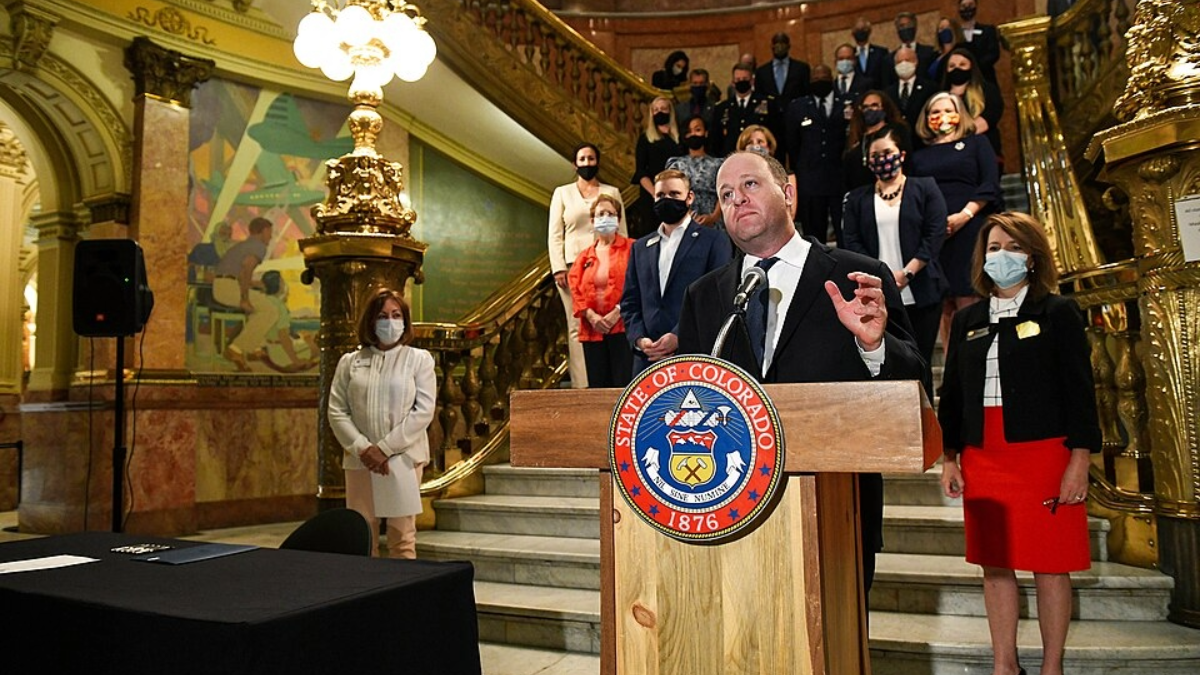In Delaying Its AI Law, Colorado Shows Tech Lobby's Power In State Politics
Serena Oduro / Aug 29, 2025
Colorado Gov. Jared Polis gives a speech during a bill signing at the Colorado State Capitol Building in Denver on June 25, 2020. (U.S. Air Force photo by Airman 1st Class Joshua T. Crossman)
After intensive lobbying by business and tech groups, Colorado has delayed implementation of its landmark artificial intelligence law. The measure, originally set to take effect in February, has now been pushed back to June, giving the tech industry another legislative session to lobby to water down the law or even have it repealed.
The Colorado AI Act (SB 24-205) marked the state’s first major law regulating AI-driven decisions, as well as a first-of-its-kind for the nation and a win for the public. The law aims to protect consumers and workers from algorithmic harm and discrimination when AI systems are used as substantial factors in decision-making in key areas related to economic opportunity, such as employment, education, health care and housing.
Colorado’s delayed implementation of its AI Act is a case study in how state governments struggle to exercise their right to regulate when dealing with the pressures of an emboldened and power-hungry federal government and a tech industry that insists that all meaningful regulations are a threat.
Colorado’s special session, which started last Thursday and ended Tuesday, was a battleground between business and tech lobby groups and consumer advocates as they pushed forward two competing bills to replace the law. Industry sought to delay the implementation of, and ultimately weaken, essential consumer protections by pushing for HB 1008. Consumer advocates, meanwhile, supported the AI Sunshine Act (SB 4), which would have protected Coloradans’ ability to address and be protected from algorithmic discrimination while reducing obligations for Colorado agencies and businesses to appease opposition to the state’s law.
While testimonies from consumer advocates, national civil society groups, and local organizations during the opening Senate Business, Labor and Technology Committee hearing for the AI Sunshine Act showed strong support, over the weekend, negotiations were influenced by industry pressure, especially complaints around the responsibility put on developers under the measure over the impacts of their AI systems. Senate Majority Leader Robert Rodriguez (D), who has championed Colorado’s AI Act and the AI Sunshine Act, told the state Senate that it “became impossible to iron out a path forward that works for everyone.” Ultimately, the AI Sunshine Act was reduced from an expansion of consumer protections to an amendment delaying implementation of the original Colorado AI Act to June.
Despite the law's passage by a broad margin in 2024, business and tech lobbying groups, echoed by Democratic Governor Jared Polis, have expressed their concern that the law might stifle innovation. An AI Task Force was tapped this year to provide amendments to the bill that could assuage business and tech lobbying groups and civil society, yet the negotiations ultimately failed. Civil society groups warned state leaders that technology companies' resistance to even the most basic requirements and protections made it impossible to come to the table and negotiate.
For years, business and tech lobbying groups have weaponized warnings of ‘stifling innovation’ as to stall, weaken and block AI policy — from California’s Automated Decision Systems Accountability Act of 2021 to the federal Algorithmic Accountability Act of 2022 to California’s Safe and Secure Innovation for Frontier Artificial Intelligence Models Act (SB 1047,) and its stripped down version in New York, the Raise Act (S6953). Whether it is establishing assessments for algorithmic systems before they are procured by the government, regulating against algorithmic discrimination or protecting citizens from the catastrophic harms that many in the tech industry itself have sounded the alarm on — to hear business and tech groups tell it, any regulation is simply too much. As Colorado’s legislature revisits its AI Act next year, this opposition to meaningful regulation will likely continue to make any meaningful compromise on the state’s law difficult.
House Republicans’ unsuccessful proposal to ban states from enforcing AI regulations for 10 years, originally inserted into US President Donald Trump’s “Big, Beautiful Bill,” highlights the alignment between this administration’s deregulatory agenda and business and tech industries’ interests. The attempted ban took the ‘innovation trumps all’ mentality a step further, framing basically any state regulation as an unacceptable threat. Fortunately, the ban prompted outcry from across the political spectrum and was removed from the bill. Yet Polis supported the moratorium, a position that suggests he might be willing to relinquish Colorado’s role as a leader in passing the nation's most important AI law to-date and instead let the tech industry ‘innovate’ with as little accountability as possible.
As the tech industry and business lobbyists side with the deregulatory agenda of the Trump administration, it is imperative that state governments do not abdicate their role to protect the public interest to curry favor with or fall prey to the deregulatory arguments of tech and business interests.
At a moment when Colorado is facing down the coercive effects of the new federal budget, the state also appears to be conceding to the same tech industry power that has shaped so much of the Trump administration's agenda. This fight is not just about whether these protections are weakened, leaving the public vulnerable to the whims of the tech industry. It’s about whether state governments are willing to uphold their obligation to work for the public or would rather undercut their power in deference to deregulatory tech and business interests.
Authors
